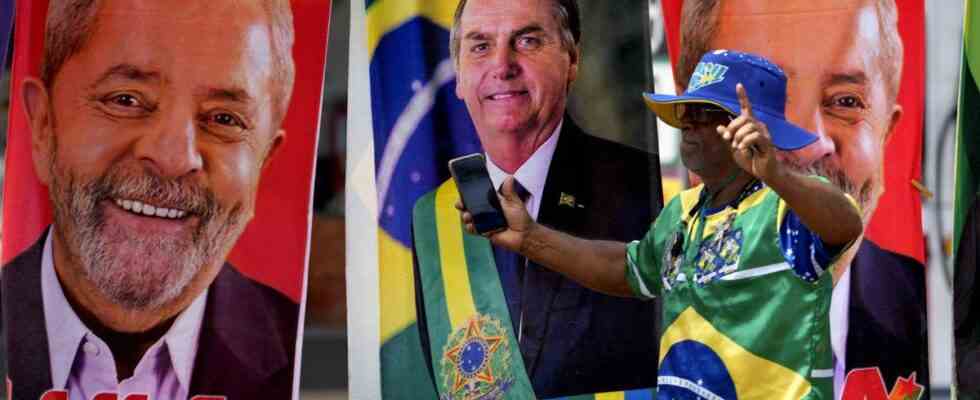Can Brazilian democracy falter? Sunday October 2, 156 million voters are called to the polls to elect the new president. The final duel should see a confrontation between two regulars of the function, Jair Bolsonaro, the outgoing president and candidate of the Liberal Party (PL), and Luiz Inacio Lula da Silva, known as Lula, already at the head of the country between 2003 and 2010 , and candidate of the Labor Party (PT). Despite nine other opponents, the two candidates lead the latest polls and present radically opposed programs in an extremely polarized society.
Voting intentions illustrate this well: 47% for Lula, 33% for the far-right president elected in 2018, according to a poll by the Brazilian institute. Datafolha. At the ballot box, there are two opposing visions of society, the economy, social issues, security, culture and the environment. And beyond that, it is “the future of democracy” that is at stake, believes Juliette Dumont, lecturer in contemporary history at the Institute for Advanced Studies in Latin America and researcher at Creda (Research Center and Documentation on the Americas), interviewed by 20 minutes. Because, “Bolsonaro has continued to attack Brazilian institutions during his tenure, putting the country in a catastrophic state on many levels,” she adds.
Bolsonaro and his irreducible
Two candidates, two different styles and above all two balance sheets. Jair Bolsonaro continues to be supported by more than 30% of the population after four years in office which have gone through an economic crisis, a political crisis, the strongly criticized management of the health crisis and a loss of speed on the international scene. The outgoing president can indeed boast of having held his line, “he has not changed his speech between his 2018 campaign and today, he has remained faithful to his ideas”, underlines Juliette Dumont. Moreover, he kept his promises, at least within the margin of maneuver of what the “establishment”, as he calls it, was able to leave him: the liberalization of the carrying of arms, the fight against abortion , and more generally the moralization of society and the political class. He put order at the heart of his concerns. It thus retains a base of sympathizers who adhere to its ultra-conservative values around God, the fatherland, the family. Ideas that give “benchmarks in a generally very turbulent period, not only in Brazil”, analyzes the specialist.
In the event of victory, he will continue his policy, will keep his course, that “of systematically destroying the institutions, the social achievements, the economy of the country”, warns Juliette Dumont again. If unemployment shows a decrease and inflation remains lower than in neighboring countries such as Argentina, “the budget balance is not at all present”, she insists. In its share of destruction, we cannot avoid addressing the environment, in particular the record deforestation of the Amazonian forest in addition to “systematic attacks on indigenous populations”, abounds the specialist. This policy has ostracized Brazil from the international community. The Latin American giant has become “a dwarf on the world stage”, says Juliette Dumont.
An optimistic memory of Lula’s balance sheet
Lula left with an advantage: when he left power in 2011, he was credited with 80% favorable opinion. An impressive score that says a lot about his record as former president of Brazil. A positive wave on which the candidate for a new election is surfing today with a program summed up in his slogan: “Let’s be happy again”. His record had indeed left Brazil economically strong, growing, with a significant presence on the international scene. An image nevertheless tarnished by the accusations of corruption and money laundering of this former head of state then Minister of the Civil House under Dilma Rousseff in 2016, spent in prison, before being finally released after the cancellation of his convictions. But the little music remains heady, especially when it is hummed loudly by his political opponent.
Today, in addition to his record, Lula draws his strength from his alliance with the Brazilian Social Democracy Party, a kind of republican front against Bolsonaro’s far right. “It’s a bit as if, in France, the PS and LR united, illustrates Juliette Dumont, which risks posing a problem of governability”. But the front holds for the moment and today represents “the hope of turning the page Bolsonaro”, adds the researcher. Thanks to this equation, Lula is in the lead, and could even be elected in the first round on Sunday.
A “Trump” scenario?
Jair Bolsonaro, with his provocative speeches, his extreme positions and his “anti-system” style, has often been nicknamed the “Brazilian Trump”. And he persists in the analogy. For several months, he has been instilling the idea that the ballot could be fraudulent due to voting by electronic ballot box, without providing the slightest proof in a country where this formula has demonstrated its reliability since 1996. The sulphurous head of state thus suggests that he will not accept the results of the vote… In case of defeat.
After Joe Biden’s victory at the end of 2020, the United States saw Donald Trump’s most ultra-supporters storming the Capitol. What to expect if Jair Bolsonaro loses the election? “Will his voters accept the result? How will the military, who have a lot to lose with the PT candidate, react? If he loses, what will happen? », worries Juliette Dumont.
Since these declarations, the outgoing Brazilian president has however moderated his remarks in order to attract a larger electorate than his militant base. “If it is God’s will, I continue. Otherwise, I will return the scarf and I will stay behind, because at my age, I have nothing more to do here on Earth, if my passage comes to an end on December 31,” he said. he declared on September 13th. It remains to be seen what his voters will think of the result.

